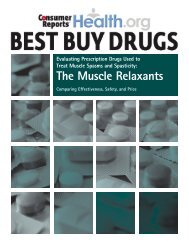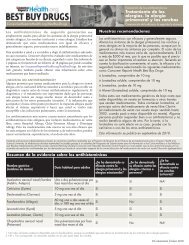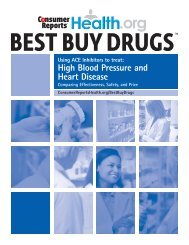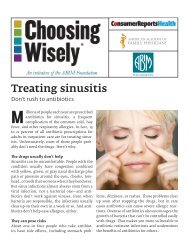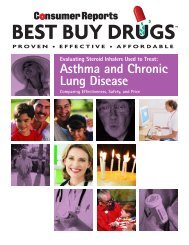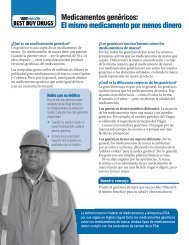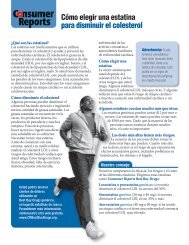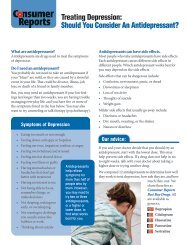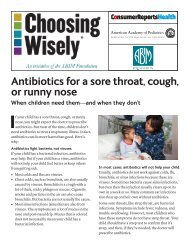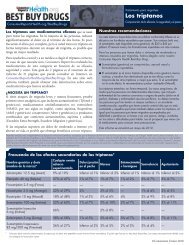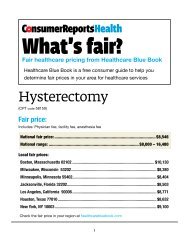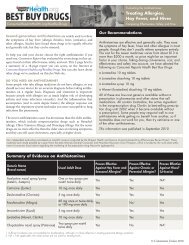Antibiotics for urinary tract infections in older people - Consumer ...
Antibiotics for urinary tract infections in older people - Consumer ...
Antibiotics for urinary tract infections in older people - Consumer ...
Create successful ePaper yourself
Turn your PDF publications into a flip-book with our unique Google optimized e-Paper software.
®<br />
<strong>Antibiotics</strong> <strong>for</strong> <strong>ur<strong>in</strong>ary</strong> <strong>tract</strong><br />
<strong><strong>in</strong>fections</strong> <strong>in</strong> <strong>older</strong> <strong>people</strong><br />
When you need them—and when you don’t<br />
<strong>Antibiotics</strong> are medic<strong>in</strong>es that can kill bacteria.<br />
Doctors often use antibiotics to treat <strong>ur<strong>in</strong>ary</strong><br />
<strong>tract</strong> <strong><strong>in</strong>fections</strong> (UTIs). The ma<strong>in</strong> symptoms<br />
of UTIs are:<br />
• A burn<strong>in</strong>g feel<strong>in</strong>g when you ur<strong>in</strong>ate.<br />
• A strong urge to ur<strong>in</strong>ate often.<br />
However, many <strong>older</strong> <strong>people</strong> get UTI treatment<br />
even though they do not have these symptoms.<br />
This can do more harm than good. Here’s why:<br />
<strong>Antibiotics</strong> usually don’t help when there are<br />
no UTI symptoms.<br />
Older <strong>people</strong> often have some bacteria <strong>in</strong> their<br />
ur<strong>in</strong>e. This does not mean they have a UTI. But<br />
doctors may f<strong>in</strong>d the bacteria <strong>in</strong> a rout<strong>in</strong>e test and<br />
give antibiotics anyway.<br />
The antibiotic does not help these patients.<br />
• It does not prevent UTIs.<br />
• It does not help bladder control.<br />
• It does not help memory problems or balance.<br />
Most <strong>older</strong> <strong>people</strong> should not be tested or treated<br />
<strong>for</strong> a UTI unless they have UTI symptoms. And if<br />
you do have a UTI and get treated, you usually<br />
don’t need another test to f<strong>in</strong>d out if you are cured.<br />
You should only get tested or treated if UTI<br />
symptoms come back.<br />
<strong>Antibiotics</strong> have side effects.<br />
<strong>Antibiotics</strong> can have side effects, such as fever,<br />
rash, diarrhea, nausea, vomit<strong>in</strong>g, headache,<br />
tendon ruptures, and nerve damage.
<strong>Antibiotics</strong> can cause future problems.<br />
<strong>Antibiotics</strong> can kill “friendly” germs <strong>in</strong> the body.<br />
This can lead to vag<strong>in</strong>al yeast <strong><strong>in</strong>fections</strong>. It can also<br />
lead to other <strong><strong>in</strong>fections</strong>, and severe diarrhea,<br />
hospitalization, and even death.<br />
Also, antibiotics may help “drug resistant” bacteria<br />
grow. These bacteria are harder to kill. They cause<br />
illnesses that are harder to cure and more costly to<br />
treat. Your doctor may have to try several antibiotics.<br />
This <strong>in</strong>creases the risk of complications. The<br />
resistant bacteria can also be passed on to others.<br />
<strong>Antibiotics</strong> can be a waste of money.<br />
Prescription antibiotics can cost from $15 to more<br />
than $100. If you get an <strong>in</strong>fection from resistant<br />
bacteria, you may need more doctor visits and<br />
medic<strong>in</strong>es that cost more.<br />
When should <strong>older</strong> <strong>people</strong> take antibiotics <strong>for</strong><br />
a UTI?<br />
If you have UTI symptoms, antibiotics can help.<br />
• The most common UTI symptoms are a pa<strong>in</strong>ful,<br />
burn<strong>in</strong>g feel<strong>in</strong>g when you ur<strong>in</strong>ate and a strong<br />
urge to “go” often.<br />
• Other UTI symptoms <strong>in</strong> <strong>older</strong> <strong>people</strong> may<br />
<strong>in</strong>clude fever, chills, or confusion. Along with<br />
these symptoms, there is usually pa<strong>in</strong> on one<br />
side of the back below the ribs or discom<strong>for</strong>t<br />
<strong>in</strong> the lower abdomen. There may be a change<br />
<strong>in</strong> the way the ur<strong>in</strong>e looks or smells.<br />
Some k<strong>in</strong>ds of surgery can cause bleed<strong>in</strong>g <strong>in</strong> the<br />
<strong>ur<strong>in</strong>ary</strong> <strong>tract</strong>—<strong>for</strong> example, prostate surgery and<br />
some procedures to remove kidney stones or<br />
bladder tumors. If you are go<strong>in</strong>g to have this<br />
surgery, you may need test<strong>in</strong>g and treatment <strong>for</strong><br />
bacteria <strong>in</strong> ur<strong>in</strong>e.<br />
This report is <strong>for</strong> you to use when talk<strong>in</strong>g with your health-care<br />
provider. It is not a substitute <strong>for</strong> medical advice and treatment.<br />
Use of this report is at your own risk.<br />
© 2013 <strong>Consumer</strong> Reports. Developed <strong>in</strong> cooperation with the<br />
American Geriatric Society. To learn more about the sources used<br />
<strong>in</strong> this report and terms and conditions of use, visit<br />
<strong>Consumer</strong>HealthChoices.org/about-us/.<br />
Advice from <strong>Consumer</strong> Reports<br />
Steps to help you<br />
prevent <strong>ur<strong>in</strong>ary</strong> <strong>tract</strong><br />
<strong><strong>in</strong>fections</strong> (UTIs)<br />
Dr<strong>in</strong>k water.<br />
Most healthy <strong>people</strong><br />
should dr<strong>in</strong>k six to<br />
eight glasses a day.<br />
A glass is about a cup<br />
or 8 ounces. If you<br />
have kidney failure,<br />
you should talk to<br />
your doctor about<br />
how much to dr<strong>in</strong>k.<br />
Don’t hold it <strong>in</strong>.<br />
If ur<strong>in</strong>e stays <strong>in</strong> the<br />
bladder too long,<br />
<strong><strong>in</strong>fections</strong> are more<br />
likely. Try to ur<strong>in</strong>ate<br />
when you first feel<br />
the need.<br />
Use good hygiene.<br />
• After a bowel movement, women should wipe<br />
from front to back, to avoid br<strong>in</strong>g<strong>in</strong>g bacteria<br />
<strong>in</strong>to the <strong>ur<strong>in</strong>ary</strong> <strong>tract</strong>.<br />
• Both men and women should ur<strong>in</strong>ate after sex<br />
to flush out bacteria.<br />
Use <strong>ur<strong>in</strong>ary</strong> catheters briefly, if at all.<br />
• Catheters are tubes put <strong>in</strong>to the bladder to<br />
help with bladder control. They <strong>in</strong>crease the<br />
risk of <strong>in</strong>fection.<br />
• Many <strong>people</strong> <strong>in</strong> long-term care, such as nurs<strong>in</strong>g<br />
homes, have catheters. They can be helpful<br />
near the end of life when com<strong>for</strong>t is the ma<strong>in</strong><br />
goal. In other cases, ask caregivers or the<br />
doctor to manage bladder-control problems<br />
without a catheter.<br />
• If you are <strong>in</strong> the hospital with a <strong>ur<strong>in</strong>ary</strong><br />
catheter, ask your doctor to remove it as soon<br />
as possible. Chances of <strong>in</strong>fection <strong>in</strong>crease<br />
after just three days.<br />
For more <strong>in</strong><strong>for</strong>mation, visit the Foundation <strong>for</strong><br />
Health <strong>in</strong> Ag<strong>in</strong>g at www.health<strong>in</strong>ag<strong>in</strong>g.org.



